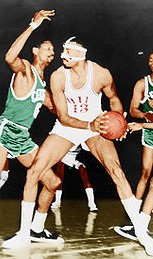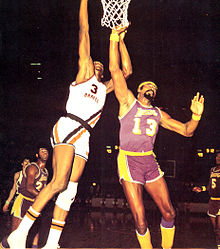
 If it were possible to detect a belly laugh from the hereafter, I’m sure there would have been something bordering on a thunderclap last week when the NBA announced Sunday’s Brooklyn-Boston preseason game would be 44 minutes instead of 48.
If it were possible to detect a belly laugh from the hereafter, I’m sure there would have been something bordering on a thunderclap last week when the NBA announced Sunday’s Brooklyn-Boston preseason game would be 44 minutes instead of 48.
On second thought, it might have been closer to a booming “WTF?” Wilt Chamberlain has been dead for 15 years, but I can guarantee the mere suggestion of reducing the length of games still irritates him.
“Forty-four minutes,” Wilt would bellow. “You can’t cut my playing time!”
Wilt did not like to sit on the bench. During the 1961-62 season, which was 80 games at the time, the Philadelphia Warriors played 3,890 minutes. That included 10 overtime periods.
The 25-year-old Wilt was on the floor for 3,882 of those minutes.
Yeah, he was on the bench for a mere eight minutes. And that was because he got two technical fouls in a game and was ejected with eight minutes left.
Although Wilt never had another season like that, he still averaged 45.8 minutes a game during his 14-year career.
 What would Wilt think? “Real men,” he would say, “don’t play 44-minute games.”
What would Wilt think? “Real men,” he would say, “don’t play 44-minute games.”
Wilt, of course, was a man of extremes and the NBA was not as demanding then as it is now. Today’s athletes are faster, quicker, bigger, better and there are more of them.
When Wilt averaged 48.5 minutes, the NBA was still three years away from having its first team – Red Auerbach’s Celtics – start five black players. Integration had occurred, but it was not full speed ahead. That made for a less talented league.
The great players of that era would still be great in today’s NBA, but the average subs and end-of-the-bench players of yesteryear would be playing pickup in YMCA games today.
With the level of athleticism exponentially higher than it was 50 years ago, you could make a pretty good argument that the 39.5 minutes a game LeBron James has averaged during his 11 years – and he is the career leader among active players – is comparable to Wilt’s career average minutes played.
Although I think the 44-minute experiment is a silly one, it shows that the NBA under Commissioner Adam Silver will continue to be open to improving the game. The league has been that way for many years, never opposed to confronting problems with rule changes and innovations. When you examine a list of NBA rule changes over the years, you find very creative solutions to problems and a willingness to make many changes from year to year depending on need.
 But the premise behind eliminating four minutes is faulty. Dallas coach Rick Carlisle is president of the NBA Coaches Association and he outlined the philosophy to reporters during the week.
But the premise behind eliminating four minutes is faulty. Dallas coach Rick Carlisle is president of the NBA Coaches Association and he outlined the philosophy to reporters during the week.
“If you do the math,” Carlisle said, “you would decrease the season on a minutes-basis by 6.8 games. From that standpoint, one of the biggest things we need to consider is the health and longevity of our players’ careers. If you could decrease the season by 6.8 games and you factor that those minutes conceivably could be at complete exhaustion, you’re energizing the season. And you’re helping your players play longer and play better.”
Here’s the problem with that. The assumption four fewer minutes each game means that star players will play four fewer minutes is flawed. Carmelo Anthony led the NBA in average minutes played last season with 38.72 a game. Know what it would have been in a 44-minute game? I’m betting on 38.72.
San Antonio’s Gregg Popovich is the NBA’s best at managing minutes. Last season, Tony Parker averaged 29.4 minutes a game, Tim Duncan averaged 29.2 and Manu Ginobili averaged 22.8. Does anybody really believe those three would have averaged four fewer minutes in a 44-minute game?
If lengthening careers is the goal, the obvious solution is to reduce the number of regular season games.
But the attractiveness of simply shortening games is that little if any commercial time will be lost. So the reality is this suggestion is primarily about preserving revenue with a theoretical possibility that it might add time to a playing career.
Besides, how much time would it really add to a playing career. Kareem Abdul-Jabbar played 20 seasons. Kevin Garnett is starting his 20th. Jason Kidd, Shaquille O’Neal, Karl Malone and John Stockton all played 19. A 44-minute game would add, at the most, another year at the end of careers when production and minutes are being reduced anyway.
But, hey, anything that creates conversation and publicity is good. And it’s always fun to think about how Wilt – who had a life of excess – would have reacted.
“In one sense, maybe 44-minute games would have been good,” Wilt might say. “That way, I could have played every minute of every game – barring something stupid by the refs – for my entire career. That would have been perfect. And if you know anything about me, you know I like being perfect.”
CHECK OUT JAN HUBBARD’S ARCHIVE FROM SHERIDAN HOOPS.COM. TERRIFIC STUFF ON THE NBA, PAST AND PRESENT.
Jan Hubbard has written about basketball since 1976 and worked in the NBA league office for eight years between media stints. Follow him on Twitter at @whyhub.
Totally on point.
Also, I don’t understand why the NBA players are so down on minutes played and back-to-backs. Not only did Wilt play 48.5mpg that year, he did so playing five nights in a row and doing most road trips by driving his own car, not flying a private jet!
44 minutes is NOT going to happen, because already Jordan said NO and he also said he didn’t think the NBA was serious.
It might just be something to satisfy the players association. The players would like less injuries, but as LeBron said, playing less games would be a better idea.
I’m happy for tomorrows game because more people will be watching my Nets on NBATV.